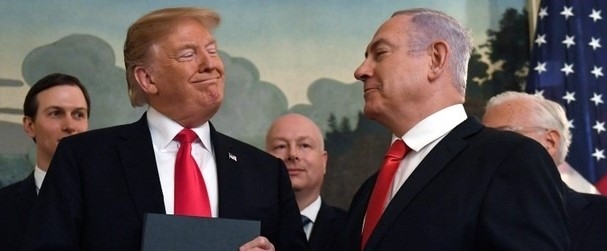Trump to Deliver Middle East ‘Peace Plan’ while Imposing Sanctions on Iran
Donald Trump said he will possibly issue the details of his long-overdue ‘peace plan’ for the Middle East before next Tuesday, after he invited the Israeli Prime Minister, Benjamin Netanyahu, and the opposition leader, Benny Gantz, to Washington for discussions.
Speaking to the reporters aboard Air Force One, the US President likened resolving one of the world’s most inflexible territorial quarrels to a ‘business deal.’
“I love doing deals,” he told reporters, “They say peace between Israel and the Palestinians is the toughest – the toughest of any deal.” He further added he would “probably release” the plan soon.
Some of the administrative features of Trump's proposal, which is scripted by Trump’s son-in-law Jared Kushner, have been released to the public. Kushner suggested a $50bn economic strategy for the Middle East to quieten the regional reception. Palestinian heads have proactively excluded any peace enterprises.
Trump told reporters that he had spoken “briefly” to the Palestinian leaders. “I’m sure they maybe will act negatively at first, but it’s actually very positive for them. They have a lot of incentive to do it,” he added.
It is clear and understandable that in contrast to the earlier efforts, which focused on getting Israeli and Palestinians heads to “find common ground,” Washington’s new strategy is outlined to be a rigid “take it or leave it, proposal.”
The Israeli press stated that the strategy would be exceptionally advantageous to the country, permitting it to take “permanent control of much of the Palestinian territories, including Jewish settlements, and all of contested Jerusalem.” The Palestinians could be allowed some formula of self-rule but under tight constraints.
These actions will doubtlessly be in line with US foreign policy in the region under the Trump administration, which has upheld itself as the most pro-Israel in US history.
A spokesperson for the Palestinian President, Mahmoud Abbas, spokein an announcement of their “absolute rejection of what the US administration has done so far, particularly the recognition of Jerusalem as Israel’s capital”.
On the other hand, Washington is pressuring Tehran with sanctions, a fresh calamity coming as one of the unpremeditated results of President Trump’s “maximum pressure” campaign against Iran, which his management hopes will force Tehran to discuss an end to its nuclear energy and surface-to-air missile programs.
The strategy includes a “broad trade embargo with restrictions on banking transactions, oil exports, supplies to Iran’s automotive sector and more.” In November 2019, Iran suddenly raised the price of gas to prop up funds, setting off a wave of regional turbulence.
By Beka Alexishvili












